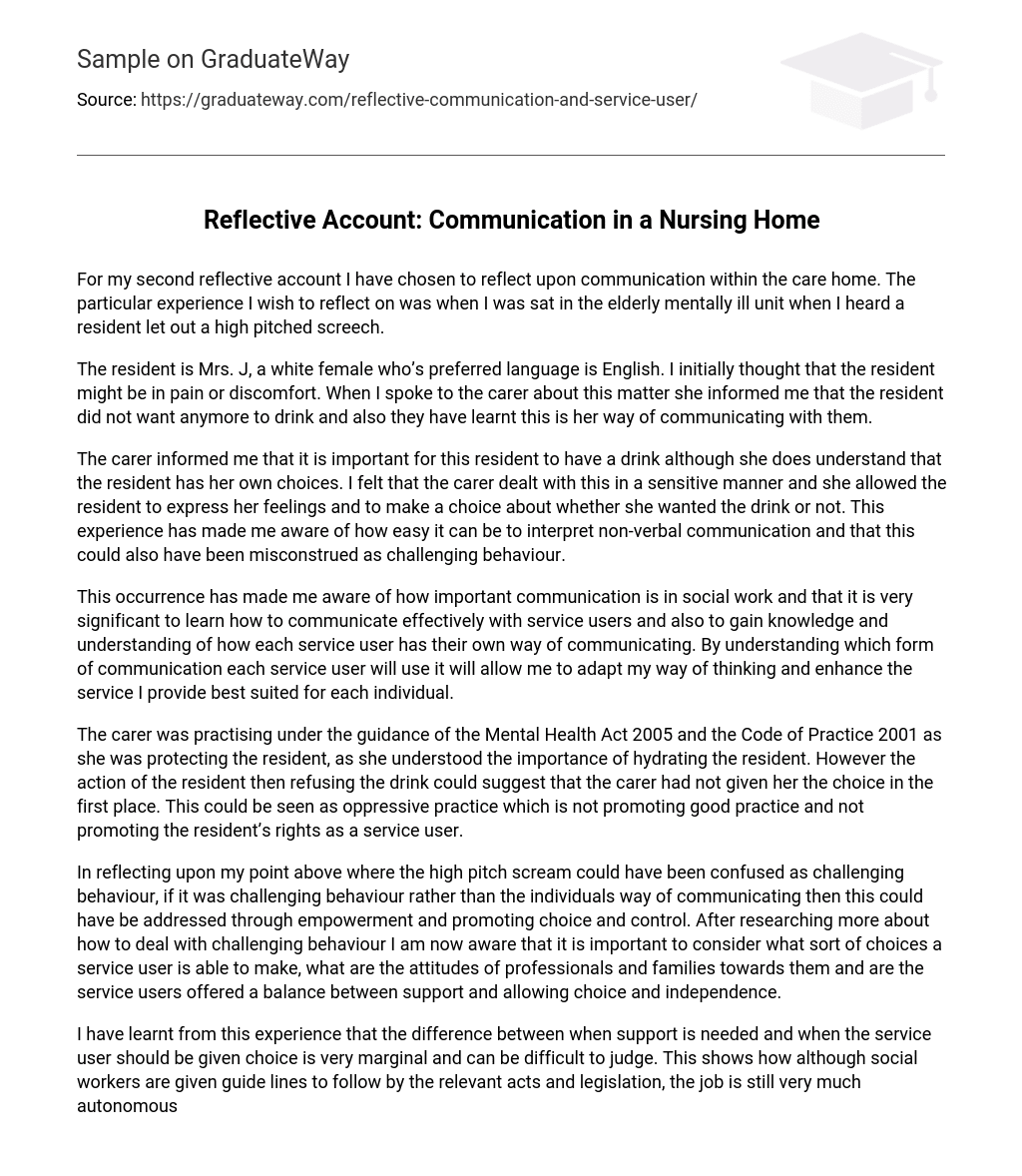For my second reflective account I have chosen to reflect upon communication within the care home. The particular experience I wish to reflect on was when I was sat in the elderly mentally ill unit when I heard a resident let out a high pitched screech.
The resident is Mrs. J, a white female who’s preferred language is English. I initially thought that the resident might be in pain or discomfort. When I spoke to the carer about this matter she informed me that the resident did not want anymore to drink and also they have learnt this is her way of communicating with them.
The carer informed me that it is important for this resident to have a drink although she does understand that the resident has her own choices. I felt that the carer dealt with this in a sensitive manner and she allowed the resident to express her feelings and to make a choice about whether she wanted the drink or not. This experience has made me aware of how easy it can be to interpret non-verbal communication and that this could also have been misconstrued as challenging behaviour.
This occurrence has made me aware of how important communication is in social work and that it is very significant to learn how to communicate effectively with service users and also to gain knowledge and understanding of how each service user has their own way of communicating. By understanding which form of communication each service user will use it will allow me to adapt my way of thinking and enhance the service I provide best suited for each individual.
The carer was practising under the guidance of the Mental Health Act 2005 and the Code of Practice 2001 as she was protecting the resident, as she understood the importance of hydrating the resident. However the action of the resident then refusing the drink could suggest that the carer had not given her the choice in the first place. This could be seen as oppressive practice which is not promoting good practice and not promoting the resident’s rights as a service user.
In reflecting upon my point above where the high pitch scream could have been confused as challenging behaviour, if it was challenging behaviour rather than the individuals way of communicating then this could have be addressed through empowerment and promoting choice and control. After researching more about how to deal with challenging behaviour I am now aware that it is important to consider what sort of choices a service user is able to make, what are the attitudes of professionals and families towards them and are the service users offered a balance between support and allowing choice and independence.
I have learnt from this experience that the difference between when support is needed and when the service user should be given choice is very marginal and can be difficult to judge. This shows how although social workers are given guide lines to follow by the relevant acts and legislation, the job is still very much autonomous in which decisions are made due to previous experiences as well as the guidance from the Care Council for Wales. The most important thing to remember is that under the Code of Practice however the choice is made, the individual’s best interest has to be at mind.
I have observed good practice at the care home as they monitor patterns of behaviour in residents by using records on a chart. These charts are also a form of communication. They allow members of staff to communicate between each other and make it clear if there has been any significant change in behaviour. This then allows each member of staff to know, even if they are relatively unfamiliar with the resident, which behaviour is normal and which behaviour is out of character and possibly challenging behaviour.
Another example of communication within the care home is using the example of Mr. A, an Italian male. Mr. A is able to speak both Italian and English however looking through his notes there is no reference as to which language is his preferred choice. During my time at the home I have only witnessed him speaking English, however learning from my first account and experience I must not make the assumption that this is his preferred choice.
I am aware that within Wales there is legislation under the Welsh Language Act 1993 which ensures service users are given the choice to communicate in the Welsh language if they wish to do so as it is their first spoken language. I understand that Mr. A’s situation is different as he is not Welsh but I feel understanding his communication choice is still important as he has the right to his own choice and this could be important in empowering him and making his life more comfortable.





